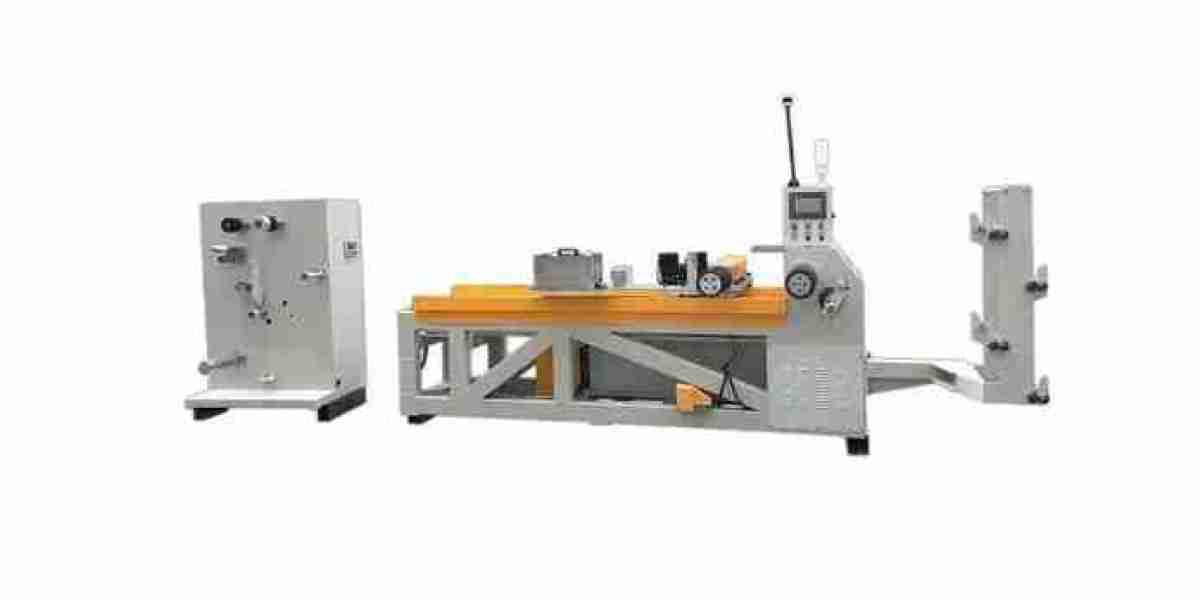An automatic coil winding machine streamlines the process of creating coils by efficiently winding wire around a core. This innovative technology enhances productivity, accuracy, and consistency in manufacturing various electrical components. By automating the winding process, these machines ensure precise coil configurations while reducing manual labor requirements. The versatility of automatic coil winding machines accommodates different wire types, sizes, and coil specifications with ease. This blog post delves into the functionalities, benefits, and applications of automatic coil winding machines to provide a comprehensive understanding of their significance in modern industrial processes.
Understanding How Coil Winding Machines Work
Precise Wire Winding
Automatic coil winding machines are designed to automate the process of winding wire onto a core or bobbin. These machines excel in ensuring precise tension control, which is crucial for achieving uniform and accurate coils. The ability to maintain consistent tension throughout the winding process results in high-quality coils that meet industry standards.
The key advantage of automatic coil winding machines lies in their capability to produce coils with exceptional precision and accuracy. By utilizing advanced technology, these machines can achieve consistent winding patterns, even when working with different wire types or sizes. This level of precision is essential for applications where quality and reliability are paramount.
Speed and Direction Control
Another significant feature of automatic coil winding machines is their flexibility in controlling both the speed and direction of the winding process. Operators can adjust the machine settings to meet specific requirements based on factors such as wire type, desired coil characteristics, or production volume. For example, when manufacturing custom coils for specialized electronic devices, being able to vary the speed and direction ensures that each coil meets exact specifications.
Pros:
Ensures precise tension control
Produces uniform and accurate coils
Offers flexibility in speed and direction control
Cons:
Initial investment cost may be high
Requires proper training for operators
Categories of Coil Winding Machines
Manual Machines
Manual coil winding machines rely on human intervention for each step of the winding process. While they are more affordable, automatic coil winding machines outperform them in terms of efficiency and productivity.
Manual machines require operators to guide wire placement manually, which can be time-consuming and prone to errors. In contrast, automatic coil winding machines automate the entire process, ensuring precise and consistent results.
Semi-Automatic Machines
Semi-automatic coil winding machines offer a middle ground between manual and automatic models. They combine some manual input with automated features to streamline the coil winding process.
Operators using semi-automatic machines still need to assist with certain tasks like wire threading or lead handling. However, these machines significantly reduce labor requirements compared to manual models while improving efficiency.
Features of High-Speed Programmable Coil Winders
Increased Production Output
High-speed programmable coil winders are designed to achieve faster winding speeds, leading to a significant boost in production output. By utilizing speed optimization and efficient programming, these machines can wind coils at a rapid pace, enhancing overall manufacturing efficiency.
These coil winders offer the ability to adjust various parameters such as wire tension, winding speed, and layer count through their programmable settings. This flexibility allows manufacturers to customize the winding process based on specific requirements for different types of coils. For instance, by adjusting the speed settings, operators can control how quickly the wire is wound around the core.
Advanced Features
High-speed programmable coil winders often come equipped with advanced features that streamline the winding process and improve overall functionality. One notable feature is the inclusion of touch screen interfaces that provide an intuitive user experience. Operators can easily navigate through different settings and make real-time adjustments using the touchscreen interface.
Moreover, these machines are integrated with data logging capabilities that allow for comprehensive tracking of winding processes. The data collected during each winding operation can be analyzed to ensure quality control and consistency in coil production. By monitoring key metrics such as speed variations and tension levels, manufacturers can identify potential issues early on and make necessary adjustments for optimal performance.
Customizable Functions for Diverse Applications
Adjustable Wire Tension
Automatic coil winding machines offer adjustable wire tension, a crucial feature that allows users to control the tightness of the wound coils. This customization is beneficial when working with different types of wires or when aiming for specific coil characteristics. By adjusting the wire tension, manufacturers can ensure consistent and precise winding results, leading to high-quality end products.
Coil winders equipped with adjustable wire tension capabilities provide flexibility in meeting various industry requirements. For instance, in the automotive sector, where coils are used in ignition systems or sensors, having control over wire tension ensures optimal performance and reliability. Similarly, in the electronics industry, precise winding with adjustable tension is essential for manufacturing transformers and inductors used in electronic devices.
Pitch Control and Multiple Winding Patterns
Pitch control is another customizable function found in automatic coil winding machines. It enables operators to adjust the distance between each winding layer based on specific design needs. This feature is particularly useful when creating coils with varying pitches or when aiming for specific electrical properties within the coil structure.
Moreover, these machines support multiple winding patterns, allowing users to choose from different configurations such as cross-winding or layer winding. The ability to switch between various patterns provides versatility for diverse applications across industries like aerospace, medical devices, and renewable energy sectors.
Multi-Axis Winding Capabilities
In addition to pitch control and multiple winding patterns, some advanced automatic coil winding machines offer multi-axis winding capabilities. This functionality allows manufacturers to create complex coil designs that require movement along multiple axes during the winding process. Industries requiring intricate coil shapes or specialized geometries benefit significantly from this customization option.
The multi-axis capability enhances precision and efficiency when producing coils for applications like electric motors, generators, or solenoids where unique shapes are necessary for optimal performance.

Quick Installation and Setup Process
User-Friendly Interfaces
Automatic coil winding machines are engineered for easy installation and setup. They boast user-friendly interfaces, simplifying the configuration process significantly. These interfaces guide operators through the setup steps, ensuring a seamless experience. By having intuitive controls, these machines reduce the learning curve for users.
The machines also come with detailed manuals that provide step-by-step instructions on how to set up and operate them efficiently. These manuals serve as valuable resources, offering clear explanations of each function and feature of the automatic coil winding machine. Technical support is often available to assist users in case they encounter any challenges during installation or setup.
Technical Support Assistance
For those new to using automatic coil winding machines, having access to technical support can be invaluable. Whether it's troubleshooting an issue or seeking guidance on optimizing performance, technical support teams are there to help ensure smooth implementation of the machine. This assistance can expedite the setup process and minimize downtime due to any potential issues that may arise.
Bullet list:
User-friendly interfaces simplify configuration.
Detailed manuals offer step-by-step instructions.
Technical support ensures smooth implementation.
Benefits in Various Industries
Enhanced Production Efficiency
Automatic coil winding machines are extensively used across industries like automotive, electronics, telecommunications, and renewable energy. By automating the winding process, these machines significantly boost production efficiency. They reduce the need for manual labor, thereby saving time and costs while increasing output.
In various sectors such as automotive and electronics, where precision is paramount, automatic coil winding machines play a crucial role. These machines work tirelessly to ensure that each coil is wound with absolute accuracy according to predefined parameters. This level of precision not only enhances operational efficiency but also guarantees consistent quality throughout the production process.
Error Reduction and Quality Control
One of the standout advantages of automatic coil winding machines lies in their ability to minimize errors during the manufacturing process. Unlike manual winding methods that are prone to inconsistencies due to human error, these automated machines follow programmed instructions meticulously. This results in coils being wound accurately every time without deviations or defects.
Pros:
Increased production output
Consistent quality control
Reduced manual labor costs
Cons:
Initial high investment cost
Common Applications and Precision Requirements
Diverse Applications
Automatic coil winding machines play a crucial role in the manufacturing of transformers, motors, solenoids, inductors, and other electrical components. Each of these applications has unique specifications that demand precise handling during the winding process. For instance, when producing transformers, the machine must ensure accurate wire tension to maintain consistent quality across all units.
These machines are also vital for creating intricate motor coils where precision is essential for optimal performance. In solenoid production, achieving the correct number of layers and maintaining a specific winding pitch is critical to ensure proper functionality. Moreover, inductor manufacturing requires strict adherence to specifications regarding wire spacing and layer count to meet performance standards.
Precision Capabilities
Automatic coil winding machines are designed to deliver exceptional precision levels required by various industries. They can efficiently handle different materials like copper or aluminum wires with utmost accuracy. By precisely controlling the rotation speed and wire tension throughout the winding process, these machines can achieve the necessary number of turns per layer consistently.
Moreover, modern automatic coil winding machines come equipped with advanced technologies such as computer numerical control (CNC) systems that enable operators to program specific specifications into the machine for customized winding patterns. This level of automation ensures high repeatability and accuracy in meeting even the most stringent requirements set by different applications.
Leading Features of Bench Winders
Compact Design
Automatic coil winding machines, also known as bench winders, are designed to be compact and portable. These machines are ideal for small-scale production or research purposes due to their space-saving design. They can easily fit on a workbench in laboratories, educational institutions, or small workshops.
Bench winders offer a range of features that make them versatile tools for various applications. One key feature is the adjustable speed control they provide. This allows users to customize the winding speed based on the specific requirements of the coils being wound. Whether high-speed winding for efficiency or slow-speed winding for precision is needed, these machines can accommodate different speeds.
Another valuable feature of bench winders is their reverse winding capability. This function enables users to unwind coils if needed without having to do it manually, saving time and effort during testing or troubleshooting processes. The ability to reverse the winding direction adds flexibility and convenience when working with different types of wires and materials.
Programmable Winding Patterns
One standout feature of automatic coil winding machines is their programmable winding patterns. Users can set specific patterns for the coils they need to wind, allowing for consistent and precise results every time. By programming the machine with predefined patterns, operators can ensure uniformity in coil production without manual intervention.
Moreover, these programmable features enable users to create complex coil designs with ease by inputting the desired parameters into the machine's system. This level of customization ensures that each coil meets exact specifications required for various applications such as transformers, sensors, antennas, or electric motors.

Summary
The exploration of automatic coil winding machines has revealed their intricate workings, diverse categories, and advanced features. From high-speed programmable options to customizable functions for various applications, these machines offer quick installation and boast benefits across multiple industries. Precision requirements are met through common applications, while bench winders showcase leading features for efficient winding processes. Understanding the nuances of these machines is crucial for businesses seeking to optimize their coil winding operations.
For those delving into the realm of automatic coil winding machines, further research into specific models and applications is recommended to harness the full potential of these advanced tools. By staying informed about the latest developments and innovations in the field, businesses can make informed decisions to enhance their manufacturing processes and stay ahead in a competitive market.
Frequently Asked Questions
How do automatic coil winding machines work?
Automatic coil winding machines work by precisely winding wire or other materials onto a core to create coils used in various applications. The machine controls the winding process, ensuring accuracy and consistency in the number of turns and tension applied to the wire.
What are the benefits of using high-speed programmable coil winders?
High-speed programmable coil winders offer increased efficiency, precision, and flexibility in producing coils for different applications. They allow for customization of winding patterns, speeds, and tension control parameters to meet specific requirements accurately.
Are customizable functions important in automatic coil winding machines?
Yes, customizable functions are crucial as they enable users to tailor the machine's operation to suit diverse application needs. Features like adjustable speed, direction control, tension settings, and pattern programming enhance versatility and ensure optimal performance across various projects.
What industries can benefit from using automatic coil winding machines?
Various industries such as electronics manufacturing, automotive sector, telecommunications industry, medical device production, and renewable energy sector can benefit from utilizing automatic coil winding machines. These machines cater to a wide range of applications requiring precise and consistent coil production.
What are some common applications that require precision from bench winders?
Bench winders are commonly used for small-scale production or prototyping where precision is essential. Applications include sensor manufacturing, transformer construction for electronic devices, and small motor production where accurate coil winding is critical for optimal performance.








